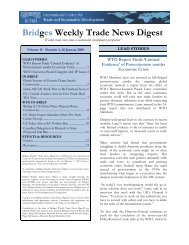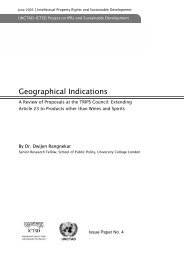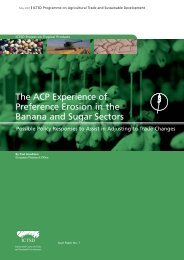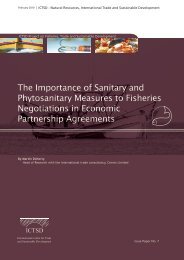Intellectual Property and Competition Law - IPRsonline.org
Intellectual Property and Competition Law - IPRsonline.org
Intellectual Property and Competition Law - IPRsonline.org
Create successful ePaper yourself
Turn your PDF publications into a flip-book with our unique Google optimized e-Paper software.
ICTSD Programme on IPRs <strong>and</strong> Sustainable DevelopmentxiFinally, there are a number of areas in which IPRs play an important role <strong>and</strong> where actions takenby governments decisively shape competitive relations. This is, for instance, the case of regulationsdetermining the requirements for marketing approval of pharmaceutical <strong>and</strong> agrochemical products.The sui generis system of “data exclusivity” applied in some countries – <strong>and</strong> promoted through freetrade agreements – confers a temporary right to the exclusive use of such data by the first applicant(generally the company that developed a new product), thereby excluding generic competition duringthe period of exclusivity. Restrictions to competition may also arise from the so-called “patentregistrationlinkage” under which a national health authority cannot approve a medicine, or is obligedto take other measures, when there are patents relating to the medicine <strong>and</strong> the applicant has notobtained the patent owner’s consent.In conclusion, IP law cannot be designed <strong>and</strong> applied in isolation from other legal disciplines,particularly competition law. The “competition policy” approach suggests that creating <strong>and</strong> preservingthe conditions for competition <strong>and</strong> market contestability in the area of IPRs, is not only the taskof “competition law” or “antitrust” authorities. Defining the right balance between competition<strong>and</strong> IPRs is an objective to be achieved through a diversity of policies <strong>and</strong> regimes. A number ofrecommendations can be made to developing countries, namely:- establish or strengthen competition laws in order to control, inter alia, possible abuses emergingfrom the acquisition <strong>and</strong> exercise of IPRs;- consider the competition implications of various policies <strong>and</strong> regimes that determine marketentry, such as marketing approval of pharmaceutical <strong>and</strong> agrochemical products;- ensure an adequate coordination among the competition law agency <strong>and</strong> other agencies whosedecisions may influence market structure <strong>and</strong> operation, with the aim of maintaining a competitiveenvironment;- fully use the flexibilities allowed by the TRIPS Agreement to determine the grounds for grantingcompulsory licences to remedy anti-competitive practices relating to IPRs;- consider, in particular, the granting of compulsory licences in cases of refusals to deal;- conceptualise <strong>and</strong> apply the essential facilities doctrine as required to address situations ofcontrol of essential technologies, taking into account the relevant market conditions <strong>and</strong> publicneeds;- develop policies, including guidelines, to prevent <strong>and</strong> correct abuses in the acquisition <strong>and</strong>enforcement of IPRs;- address situations that may normally lead to anti-competitive conduct such as “package” <strong>and</strong>“thicket” patents;- adopt guidelines for use at the patent offices to prevent the granting of frivolous or low qualitypatents, as well as patents containing overly broad claims, which may be used to unduly restrainlegitimate competition <strong>and</strong> block innovation;- avoid “linkage” provisions <strong>and</strong> data exclusivity in order to promote competition in markets ofregulated products.









